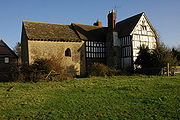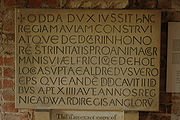
Earl Odda
Encyclopedia

Anglo-Saxons
Anglo-Saxon is a term used by historians to designate the Germanic tribes who invaded and settled the south and east of Great Britain beginning in the early 5th century AD, and the period from their creation of the English nation to the Norman conquest. The Anglo-Saxon Era denotes the period of...
nobleman active in the period from 1013 onwards. He became a leading magnate in 1051, following the exile of Godwin, Earl of Wessex
Godwin, Earl of Wessex
Godwin of Wessex , was one of the most powerful lords in England under the Danish king Cnut the Great and his successors. Cnut made him the first Earl of Wessex...
and his sons and the confiscation of their property and earldoms, when King Edward the Confessor
Edward the Confessor
Edward the Confessor also known as St. Edward the Confessor , son of Æthelred the Unready and Emma of Normandy, was one of the last Anglo-Saxon kings of England and is usually regarded as the last king of the House of Wessex, ruling from 1042 to 1066....
appointed Odda as earl
Earl
An earl is a member of the nobility. The title is Anglo-Saxon, akin to the Scandinavian form jarl, and meant "chieftain", particularly a chieftain set to rule a territory in a king's stead. In Scandinavia, it became obsolete in the Middle Ages and was replaced with duke...
over a portion of the vacated territory. Earl Godwin was later restored to royal favour, and his lands returned, while Odda received a new earldom in the west midlands in compensation. Odda became a monk late in life. He was buried at Pershore Abbey
Pershore Abbey
Pershore Abbey, at Pershore in Worcestershire, was an Anglo-Saxon abbey and is now an Anglican parish church.-Foundation:The foundation of the minster at Pershore is alluded to in a spurious charter of King Æthelred of Mercia...
.
Background
Odda perhaps first appears in the record as a charter witness in 1013 or 1014, late in the reign of King Æthelred the Unready, from which evidence it is presumed he was born no later than 993. His brother Ælfric, commemorated in the dedication of Odda's ChapelOdda's Chapel
Odda's Chapel is a surviving Saxon church at Deerhurst, Gloucestershire. Earl Odda had it built for the benefit of the soul of his brother Aelfric, who died on 22 December 1053. Bishop Ealdred consecrated it: an inscription dates the dedication to 12 April 1056...
at Deerhurst
Deerhurst
Deerhurst is a village near Tewkesbury in Gloucestershire, England on the east bank of the River Severn. The Royal Mail postcode begins GL19.- Anglo Saxon church & chapel :...
, died on 22 December 1053. Their sister, named Ealdgyth, appears in Domesday Book
Domesday Book
Domesday Book , now held at The National Archives, Kew, Richmond upon Thames in South West London, is the record of the great survey of much of England and parts of Wales completed in 1086...
. She may have outlived her brothers and perhaps was still living after the Norman Conquest.
William of Malmesbury
William of Malmesbury
William of Malmesbury was the foremost English historian of the 12th century. C. Warren Hollister so ranks him among the most talented generation of writers of history since Bede, "a gifted historical scholar and an omnivorous reader, impressively well versed in the literature of classical,...
describes Odda as a kinsman of King Edward the Confessor
Edward the Confessor
Edward the Confessor also known as St. Edward the Confessor , son of Æthelred the Unready and Emma of Normandy, was one of the last Anglo-Saxon kings of England and is usually regarded as the last king of the House of Wessex, ruling from 1042 to 1066....
. The writings of 16th century antiquarian
Antiquarian
An antiquarian or antiquary is an aficionado or student of antiquities or things of the past. More specifically, the term is used for those who study history with particular attention to ancient objects of art or science, archaeological and historic sites, or historic archives and manuscripts...
John Leland contain an annal, perhaps from Pershore Abbey, which gives Odda's father's name as "Elfer", that is Ælfhere. On chronological grounds, this is unlikely to be Ælfhere, Ealdorman of Mercia
Ælfhere, Ealdorman of Mercia
Ælfhere was ealdorman of Mercia. His family, along with those of Æthelstan Half-King and Æthelstan Rota, rose to greatness in the middle third of the 10th century. In the reign of Edward the Martyr, Ælfhere was a leader of the anti-monastic reaction and an ally of Edward's stepmother Queen Dowager...
, who died in 983, although the Pershore chronicler may have believed that they were the same person. Williams proposes that Odda was a descendant, perhaps a grandson, of one of the siblings of the chronicler Ealdorman Æthelweard and Ælfgifu, wife of Edward's great-uncle King Eadwig.
Life

Harold Harefoot
Harold Harefoot was King of England from 1037 to 1040. His cognomen "Harefoot" referred to his speed, and the skill of his huntsmanship. He was the son of Cnut the Great, king of England, Denmark, and Norway by Ælfgifu of Northampton...
and Harthacnut, it was not until the reign of Edward the Confessor that he became a leading figure in the land. The evidence of Domesday Book suggests that during Edward's reign Odda held at least 167 hide
Hide (unit)
The hide was originally an amount of land sufficient to support a household, but later in Anglo-Saxon England became a unit used in assessing land for liability to "geld", or land tax. The geld would be collected at a stated rate per hide...
s of land, which placed him among the magnates and great landowners of England. He held half, some 60 hides, of estate of Deerhurst, lying mainly in Gloucestershire
Gloucestershire
Gloucestershire is a county in South West England. The county comprises part of the Cotswold Hills, part of the flat fertile valley of the River Severn, and the entire Forest of Dean....
, and smaller estates in Devon
Devon
Devon is a large county in southwestern England. The county is sometimes referred to as Devonshire, although the term is rarely used inside the county itself as the county has never been officially "shired", it often indicates a traditional or historical context.The county shares borders with...
, Herefordshire
Herefordshire
Herefordshire is a historic and ceremonial county in the West Midlands region of England. For Eurostat purposes it is a NUTS 3 region and is one of three counties that comprise the "Herefordshire, Worcestershire and Gloucestershire" NUTS 2 region. It also forms a unitary district known as the...
, Warwickshire
Warwickshire
Warwickshire is a landlocked non-metropolitan county in the West Midlands region of England. The county town is Warwick, although the largest town is Nuneaton. The county is famous for being the birthplace of William Shakespeare...
and Worcestershire
Worcestershire
Worcestershire is a non-metropolitan county, established in antiquity, located in the West Midlands region of England. For Eurostat purposes it is a NUTS 3 region and is one of three counties that comprise the "Herefordshire, Worcestershire and Warwickshire" NUTS 2 region...
.
Odda was one of the major beneficiaries of the dispute between King Edward and Earl Godwin which led to Godwin's exile in 1051. He was appointed earl of Somerset
Somerset
The ceremonial and non-metropolitan county of Somerset in South West England borders Bristol and Gloucestershire to the north, Wiltshire to the east, Dorset to the south-east, and Devon to the south-west. It is partly bounded to the north and west by the Bristol Channel and the estuary of the...
, Dorset
Dorset
Dorset , is a county in South West England on the English Channel coast. The county town is Dorchester which is situated in the south. The Hampshire towns of Bournemouth and Christchurch joined the county with the reorganisation of local government in 1974...
, Devon
Devon
Devon is a large county in southwestern England. The county is sometimes referred to as Devonshire, although the term is rarely used inside the county itself as the county has never been officially "shired", it often indicates a traditional or historical context.The county shares borders with...
and Cornwall
Cornwall
Cornwall is a unitary authority and ceremonial county of England, within the United Kingdom. It is bordered to the north and west by the Celtic Sea, to the south by the English Channel, and to the east by the county of Devon, over the River Tamar. Cornwall has a population of , and covers an area of...
. Ralf of Mantes and Ælfgar
Ælfgar, Earl of Mercia
Ælfgar was son of Leofric, Earl of Mercia,by his well-known wife Godgifu . He succeeded to his father's title and responsibilities on the latter's death in 1057....
were the others who gained greatly from the fall of Godwin and his sons.
Earls Odda and Ralf commanded the forces raised in 1052 to patrol against any attempt by the exiles to return. The fleet and army led by Odda and Ralf drove off an invasion led by Godwin in Sussex
Sussex
Sussex , from the Old English Sūþsēaxe , is an historic county in South East England corresponding roughly in area to the ancient Kingdom of Sussex. It is bounded on the north by Surrey, east by Kent, south by the English Channel, and west by Hampshire, and is divided for local government into West...
, but the king was eventually forced to revoke the exile and restore lands and earldoms to Godwin and his sons. Odda was thus deprived of his earldom in the west within months of receiving it, but he remained an earl, and was compensated with lands in Worcestershire and perhaps Gloucestershire.
Odda was responsible for the building of Odda's Chapel
Odda's Chapel
Odda's Chapel is a surviving Saxon church at Deerhurst, Gloucestershire. Earl Odda had it built for the benefit of the soul of his brother Aelfric, who died on 22 December 1053. Bishop Ealdred consecrated it: an inscription dates the dedication to 12 April 1056...
in Deerhurst as a chantry
Chantry
Chantry is the English term for a fund established to pay for a priest to celebrate sung Masses for a specified purpose, generally for the soul of the deceased donor. Chantries were endowed with lands given by donors, the income from which maintained the chantry priest...
where masses would be said for the soul of his brother Ælfric, who died in 1053 and was buried at Pershore Abbey. Odda himself died at Deerhurst on 31 August 1056, having been ordained a monk by Bishop Aldred
Aldred
Ealdred was Abbot of Tavistock, Bishop of Worcester, and Archbishop of York in Anglo-Saxon England. He was related to a number of other ecclesiastics of the period. After becoming a monk at the monastery at Winchester, he was appointed Abbot of Tavistock Abbey in around 1027. In 1046 he was named...
of Worcester, perhaps having taken the monastic name Æthelwine. He too was buried at Pershore.
The chronicler John of Worcester
John of Worcester
John of Worcester was an English monk and chronicler. He is usually held to be the author of the Chronicon ex chronicis.-Chronicon ex chronicis:...
described Odda as "a lover of churches, restorer of the poor, defender of widows and orphans, helper of the oppressed, guardian of chastity".

